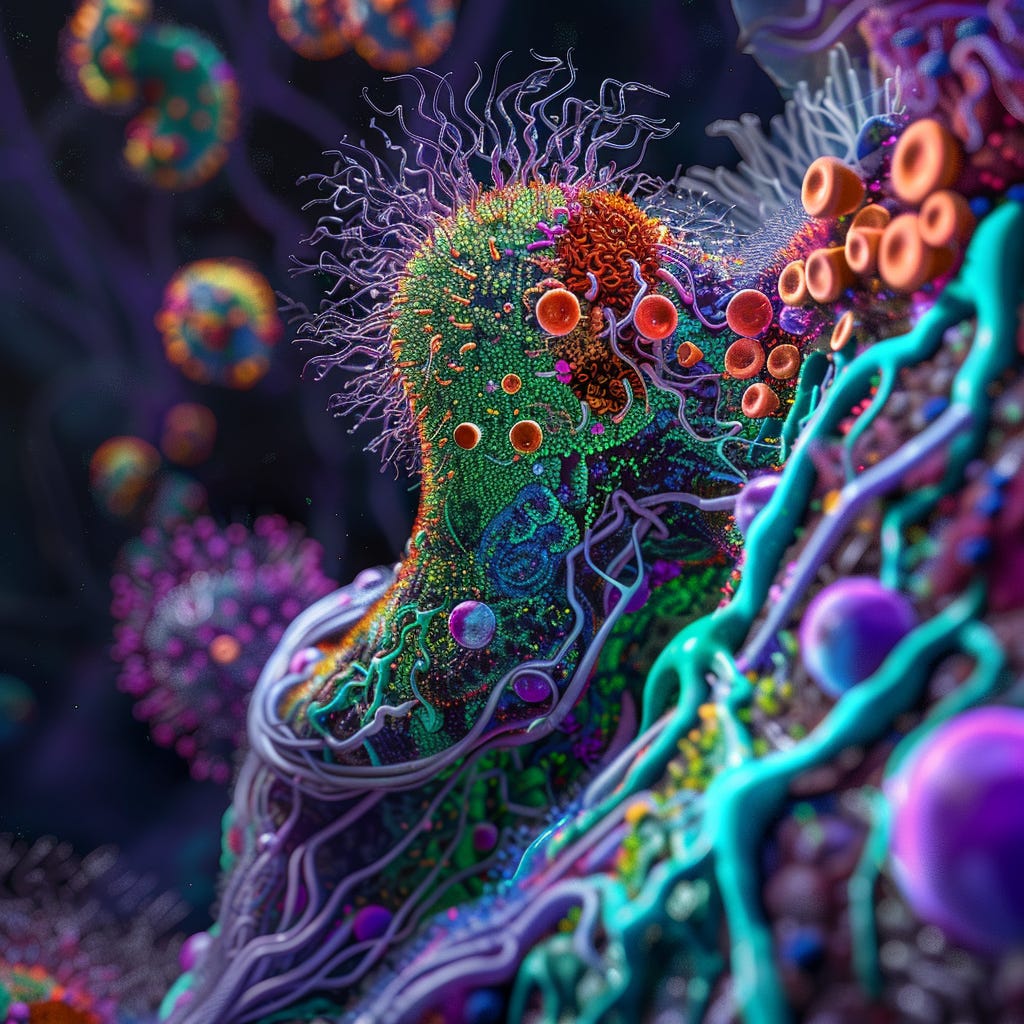L-Cells: The Gut's Key Players in Keeping You Healthy
Deep within the intricate workings of your digestive system exists a specialized group of cells known as L cells. These tiny but powerful cells are vital to maintaining your body's health and well-being. Predominantly located in the distal regions of your small intestine (ileum) and throughout your large intestine (colon), L cells are responsible for secreting a variety of hormones, including glucagon-like peptide-1 (GLP-1), glucagon-like peptide-2 (GLP-2), oxyntomodulin, and peptide YY (PYY)[2][3][15].
Among the hormones secreted by L cells, GLP-1 is a key player in regulating your body's glucose metabolism and appetite. When your blood sugar levels rise, GLP-1 stimulates your pancreas to release insulin, a hormone that helps your cells absorb glucose from the bloodstream. Simultaneously, GLP-1 inhibits the secretion of glucagon, a hormone that would otherwise prompt your liver to release stored glucose, further elevating blood sugar levels. By slowing down the emptying of your stomach and reducing your appetite, GLP-1 also contributes to weight management. Due to these remarkable properties, GLP-1 and its mimetic drugs are being extensively researched and used in treatments for type 2 diabetes and obesity [4][10].
In addition to their hormone-secreting functions, L cells act as vigilant nutrient sensors within your digestive tract. These cells are equipped with specialized receptors that allow them to detect the presence of carbohydrates, fats, and proteins as they pass through your gut. In response to these nutrients, L cells release their hormones, which regulate your metabolism and communicate with your brain to influence your appetite and satiety. Interestingly, the density of L cells increases along the length of your intestines, with the highest concentration found in the ileum and colon. This strategic distribution enables L cells to effectively monitor and respond to nutrients that have not been absorbed in the upper portions of your small intestine [2][3][16].
Effects of a Damaged Gut Lining & Your Weight
However, when L cells are damaged or their function is compromised, it can lead to health problems. Impaired L cell function can result in difficulty controlling blood sugar levels, as the secretion of GLP-1 and other hormones may be diminished. This, in turn, can increase the risk of developing insulin resistance and type 2 diabetes. Moreover, dysfunctional L cells may increase appetite and a weakened sense of satiety, potentially contributing to weight gain and obesity. A compromised gut barrier, often associated with L-cell dysfunction, can allow harmful substances to leak into the bloodstream, triggering inflammation and increasing the risk of various digestive disorders[1][4][12][14][19].
Several factors can contribute to the development of L cell dysfunction, particularly those that negatively impact the health and integrity of your gut. A diet high in saturated fats, processed foods, and low in fiber can promote inflammation, damage intestinal cells, and lead to a condition known as "leaky gut." Heavy alcohol consumption can also exacerbate these effects, compromising L cell function [1][2]. Chronic stress, exposure to environmental pollutants, gut infections, and using certain medications can also disrupt the delicate balance of your gut environment, increasing the risk of L-cell dysfunction[1][2].
Gut Microbiome & Your Weight
The trillions of microbes that inhabit your gut, collectively known as the gut microbiome, also play a significant role in developing L-cell dysfunction. The intricate interactions between the metabolites produced by these microbes, your immune system, and the various cells in your gut, including L cells, can significantly influence L cell function, hormone secretion, and overall gut health[1][2][6][7][17][18]. An imbalance in the production of specific microbial metabolites, such as short-chain fatty acids, can alter the function of L cells and disrupt the normal secretion of hormones.
While the direct impact of pesticides, like glyphosate, on L cells has not been extensively studied, the known effects of glyphosate and glyphosate-based herbicides (GBHs) on other cell types suggest potential mechanisms through which these substances could impair L cell function[1][2][6]. Glyphosate exposure has been linked to cellular damage, genetic alterations, mitochondrial dysfunction (impairment of the cell's energy-producing organelles), immune system interference, changes in the gut microbiome composition, and a weakened gut barrier. These effects could extend to L cells, compromising their ability to function optimally.
The take-home point is that L cells are indispensable in maintaining your body's metabolic health and overall well-being. Their dysfunction can lead to a wide array of health issues, ranging from impaired glucose metabolism and appetite regulation to an increased risk of digestive disorders. Understanding the risk factors and underlying mechanisms of L cell dysfunction, including the complex interplay between the gut microbiome, environmental factors, and dietary habits, is crucial for developing targeted preventive measures and therapeutic interventions.
As research unravels the intricacies of the gut-brain axis and the pivotal role of L cells within this system, preserving and promoting L cell health becomes increasingly evident. By adopting a balanced diet rich in fiber, minimizing exposure to environmental toxins, managing stress, and supporting a healthy gut microbiome, we can take proactive steps to maintain the optimal function of these tiny but mighty cells, paving the way for better metabolic health and overall well-being.
Sources:
[1] https://www.nature.com/articles/s12276-018-0126-x
[2] https://www.frontiersin.org/articles/10.3389/fnut.2015.00023/full
[3] https://www.ncbi.nlm.nih.gov/pmc/articles/PMC4507148/
[4] https://www.nature.com/articles/s41467-019-10189-x
[5] https://www.nature.com/articles/s41467-021-21235-y
[6] https://www.frontiersin.org/articles/10.3389/fmicb.2020.575595/full
[7] https://www.frontiersin.org/articles/10.3389/fcimb.2022.903570/full
[8] https://www.nature.com/articles/s41598-017-18079-2
[9] https://pubmed.ncbi.nlm.nih.gov/34098509/
[10]https://diabetesjournals.org/spectrum/article/17/3/183/1994/Glucose-Metabolism-and-Regulation-Beyond-Insulin
[11] https://academic.oup.com/endo/article/153/7/3076/2423697
[12] https://www.ncbi.nlm.nih.gov/pmc/articles/PMC5288588/
[13] https://www.bjsacademy.com/a-surprising-role-for-enteroendocrine-cells-and-glp-1-in-regulating-intestinal-inflammation
[14] https://en.wikipedia.org/wiki/Enteroendocrine_cell
[15] https://joe.bioscientifica.com/view/journals/joe/228/1/39.xml
[16] https://www.glucagon.com/gutendocrinecells.html
[17] https://www.news-medical.net/health/What-are-Enteroendocrine-Cells.aspx
Dr. Hector Caraballo, MD, is a physician who gained invaluable insights into the art of healing and medicine through his own life-changing health crisis. In today's fast-paced world, Dr. Caraballo emphasizes the importance of mastering 'The Medicine of You', an approach that invites individuals to become data-driven about their health markers that can impact both lifespan and healthspan. Through his writing, he aims to empower people to take control of their health before a significant crisis occurs, using his own experience as a gift to help others navigate the complexities of health and well-being.
Dr. Caraballo is the founder of Vital Essence Medica, an online medical consultation service leveraging regenerative, personalized, and functional medicine. He also serves as the Medical Director of IV Essence in San Antonio, Texas.







